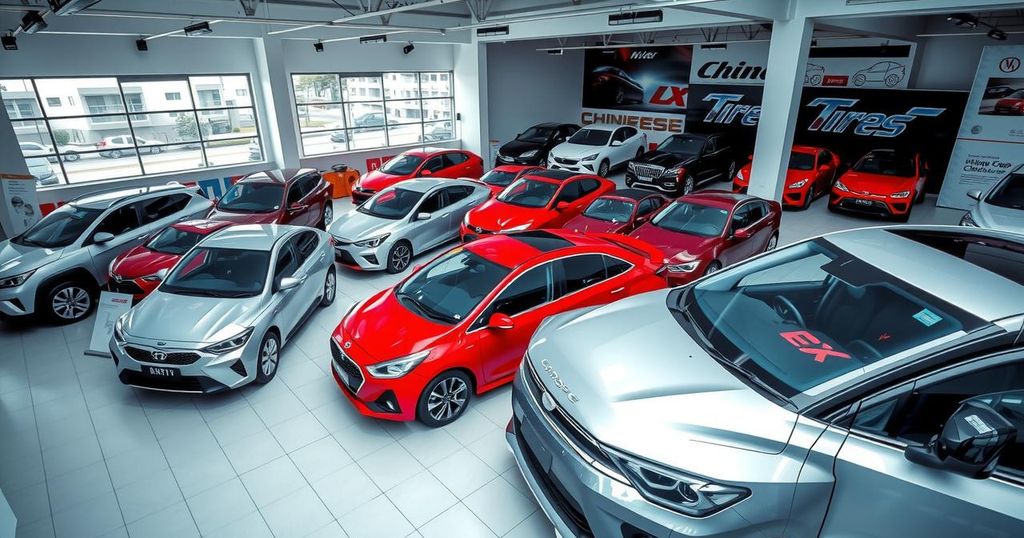Chinese Automakers Challenge Indonesia’s Auto Market with EV Expansion

Chinese carmakers are increasing their presence in Indonesia, offering affordable EVs that take market share from Japanese and South Korean brands. Despite challenges in the broader automotive market, the growth in EV offerings and government incentives is drawing interest. However, potential economic headwinds could limit overall growth in new car sales.
Over the past three years, new Chinese carmakers have entered the Indonesian market, presenting affordable and feature-rich electric vehicles (EVs) that challenge the dominance of established Japanese and South Korean brands. Despite a recent decline in new car sales, these automakers are enticed by the competitive advantages of tax breaks offered by Indonesia on imported vehicles and increasing competition in their local market.
According to SAIC Motor’s 2023 report, escalating market competition has led to unprecedented price wars, with EV prices decreasing by an average of 10% just in December to boost deliveries and achieve annual sales goals. This competitive landscape resulted in BYD surpassing SAIC Motor as Indonesia’s top car seller last year.
Chinese manufacturers, facing spare capacity issues, rely heavily on exports. Goldman Sachs reports that these automakers can produce approximately 20 million units per year, with only 11 million sold domestically last year. In the three years to 2024, China’s auto exports surged over three times to six million units, establishing China as the world’s largest car exporter, while automotive exports to Indonesia doubled in value to $3.2 billion.
Following the entry of Wuling and DFSK pre-pandemic, numerous other Chinese brands like Great Wall Motors, BYD, Neta, and Chery have also entered Indonesia. In early 2023, brands including Changan, Honri, and Xpeng announced their entry, with some establishing local factories while others continue to rely on completely built-up (CBU) imports.
Analyst Koketso Tsoai from Fitch Solutions remarks that Chinese automakers are penetrating the Indonesian market by offering advanced and competitively priced vehicles. He notes that brands like Wuling have successfully captured market share from Hyundai by providing compelling product offerings alongside competitive pricing, appealing to local consumers.
Government incentives, such as VAT and luxury goods tax discounts for EVs with varying local content, further sweeten the deal for these automakers. However, Redseer Southeast Asia partner Roshan Raj warns that this influx of new automotive entries may not significantly increase overall new car sales in 2023 due to broader economic challenges.
Data from Gaikindo indicates that Chinese automakers have increased their market share from 3.4% in 2021 to 6.4% in 2022, while Japanese brands have declined from 95% to 89.3%. Hyundai’s aggressive promotion of its Ioniq EV lineup briefly raised its market share to 3.5% in 2023 but fell to 2.6% last year.
Concerns about the impact of Chinese EV imports on local competitors have arisen, particularly from Hyundai, which has reported a 30% decline in local plant utilization since 2022. Lawmaker Lamhot Sinaga emphasized that Hyundai, a pioneer in local EV production, should not be compared to firms that merely import vehicles without local manufacturing investments.
Industry Minister Agus Gumiwang Kartasasmita has urged foreign automakers to enhance local production instead of relying solely on imports, stressing the importance of meeting local content requirements to support domestic businesses.
Yannes Martinus Pasaribu, an analyst at ITB, believes that the long-term strategy for Chinese automakers includes establishing manufacturing plants and a local supply chain in Indonesia, although challenges such as dealership networks, after-sales service, and public perception of Chinese brands need to be addressed for success.
Chinese automakers are rapidly expanding in Indonesia, effectively challenging established brands with competitive pricing and feature-rich EVs. Despite growth in market share from 3.4% to 6.4%, broader economic issues limit the potential for increased new car sales. Ongoing investments and efforts to build local production capabilities will be essential for these brands to succeed in the Indonesian market. The landscape remains dynamic, with potential impacts on existing competitors like Hyundai.
Original Source: www.thestar.com.my




